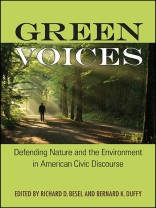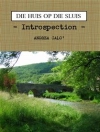The written works of nature’s leading advocates—from Charles Sumner and John Muir to Rachel Carson and President Jimmy Carter, to name a few—have been the subject of many texts, but their speeches remain relatively unknown or unexamined.
Green Voices aims to redress this situation. After all, when it comes to the leaders, heroes, and activists of the environmental movement, their speeches formed part of the fertile earth from which uniquely American environmental expectations, assumptions, and norms germinated and grew. Despite having in common a definitively rhetorical focus, the contributions in this book reflect a variety of methods and approaches. Some concentrate on a single speaker and a single speech. Others look at several speeches. Some are historical in orientation, while others are more theoretical. In other words, this collection examines the broad sweep of US environmental history from the perspective of our most famous and influential environmental figures.
This book is freely available in an open access edition thanks to Knowledge Unlatched—an initiative that provides libraries and institutions with a centralized platform to support OA collections and from leading publishing houses and OA initiatives. Learn more at the Knowledge Unlatched website at:
https://www.knowledgeunlatched.org/, and access the book online at the SUNY Open Access Repository at
http://hdl.handle.net/20.500.12648/7126.
Jadual kandungan
Foreword
Philip C. Wander
Acknowledgments
Introduction: Green Voices in the Swelling Chorus of American Environmental Advocacy
Richard D. Besel and Bernard K. Duffy
1. Coming to Grips with the Size of America’s Environment: Charles Sumner Says Farewell to Montesquieu
Michael J. Hostetler
2. ‘I had been crying in the wilderness’: John Muir’s Shifting Sublime Response
Richard D. Besel and Bernard K. Duffy
3. Theodore Roosevelt and the Progressive Impulses of Conservation
Leroy G. Dorsey
4. See America First! The Aesthetics of Environmental Exceptionalism
Anne Marie Todd
5. A Call to Partnership, Health, and Pure Fire: A Vital Vision of the Future in Aldo Leopold’s ‘The Farmer as a Conservationist’ Address
Melba Hoffer
6. ‘Conserving not scenery, but the human spirit itself’: The Environmental Oratory of Sigurd Olson
C. Brant Short
7. ‘What’s wrong with a little emotion?’: Margaret E. Murie’s Wilderness Rhetoric
Elizabeth Lawson
8. Rachel Carson’s War of Words against Government and Industry: Challenging the Objectivity of American Scientific Discourse
Michel M. Haigh and Ann Marie Major
9. Mortification and Moral Equivalents: Jimmy Carter’s Energy Jeremiad and the Limits of Civic Sacrifice
Terence Check
10. Lois Gibb’s Rhetoric of Care: Voicing a Relational Ethic of Compassion, Inclusivity, and Community in Response to the Toxic Disaster at Love Canal
Katie L. Gibson
11. Frank Church’s Natural Place in American Public Address: Light Green Orations That Saved ‘The River of No Return Wilderness’
Ellen W. Gorsevski
12. ‘We will live to piss on their graves’: Edward Abbey, Radical Environmentalism, and the Birth of Earth First!
Derek G. Ross
13. ‘I’m angry both as a citizen and a father’: Robert F. Kennedy Jr.’s Melodramatic Discourse on the Environmental Consequences of ‘Crony Capitalism’
Ross Singer
14. Ashley Judd’s Indictment of Mountaintop Removal Coal Mining: A Stain on the Conscience of America
Beth M. Waggenspack and Matthew Vandyke
15. Environmental Racism and Environmental Justice: Benjamin Chavis Jr. and Issues of Definition and Community
Richard W. Leeman
About the Contributors
Index
Mengenai Pengarang
Richard D. Besel is Associate Professor of Communication Studies at California Polytechnic State University, San Luis Obispo and coeditor (with Jnan A. Blau) of
Performance on Behalf of the Environment.
Bernard K. Duffy is Professor and Department Chair of Communication Studies at California Polytechnic State University, San Luis Obispo and coeditor (with Richard W. Leeman) of
The Will of a People: A Critical Anthology of Great African American Speeches.












